Diplomatic touch
Updated: 2015-01-09 10:59
By Pu Zhendong(China Daily Europe)
|
|||||||||||
As the EU and China prepare to celebrate 40 years of ties, the two are drawing more closer
A more confident and assertive China has been laying the foundations for a fresh approach to diplomacy over the past year, and Europe has been central to that.
The continent appeared most frequently on Chinese leaders' overseas travel itineraries last year. In March, President Xi Jinping paid a historic visit to the Netherlands, France, Germany and Belgium to forge what he called a "partnership of civilizations" with the European Union that centers on peace, growth and change.
A visit by Premier Li Keqiang to Kazakhstan, Serbia and Thailand last month drew to a close a year that Foreign Minister Wang Yi says was one of "harvesting for Chinese diplomacy".
The main elements in the fresh approach China is taking to its diplomacy are stabilizing its neighborhood, promoting global economic growth and forging a network of partners, analysts say.
Duncan Freeman, research fellow at the Brussels Institute of Contemporary China Studies, hails Xi's visit to Brussels as a major event in EU-China ties. It defused some of the issues over which the two had been at loggerheads and pointed the way to a more positive relationship, he says.
"Beijing increasingly asserts the importance of the relationship it has with the EU. In China's multipolar worldview the EU is, or at least should be, a pole in the global order. China is not just an economic giant but also an important global actor that the EU cannot ignore."
Li visited Europe three times last year, advancing collaboration with major EU members such as Germany. The annual meeting with Central and Eastern European leaders also opened new channels to introduce China-made products, high-speed rail equipment and technology in particular, to the continent.
"The EU and China are searching for better markets to each other, along with better knowledge of partnerships and intellectual collaboration," says Kerry Brown, associate fellow at Chatham House, the Royal Institute of International Affairs, a think tank in London.
"It is an era of diversification of China's diplomatic partnerships, as well as big new narratives within which to frame Chinese foreign affairs - the 'new Silk Road' with Russia, Eastern Europe, Middle East and Central Asia, and 'civilizational partnerships' with the EU."
But as important as Europe is to China, its efforts to forge a new type of diplomacy stretch much more broadly. Last year, Xi and Li conducted 12 overseas visits to 30 countries.
China has built special partnerships with 67 countries and five regional organizations, illustrating the "major-country style" in a non-aligned but partner-up approach.
Over the past year Chinese leaders advocated new economic and security concepts at multilateral conferences such as the Nuclear Security Summit in the Netherlands, the sixth BRICS Summit in Brazil and the Shanghai Cooperation Organization Summit in Tajikistan.
At the Central Conference on Work Relating to Foreign Affairs in Beijing in November, Xi highlighted China's pursuit of a "major-country diplomacy with Chinese characteristics" based on continuity and consistency with the country's foreign policy.
Observers say the remarks signaled a shift from China's traditional approach of keeping a low profile to striving for accomplishments, in keeping with its status as an economic giant.
In 2013, Xi enunciated in a work conference China's neighborhood diplomacy featuring the principles of amity, sincerity, mutual benefit and inclusiveness that analysts say set the tone for the country's diplomatic priorities in coming years.
When Xi was in Brussels last year, China and the EU reaffirmed their determination to sign an investment treaty and eventually a China-EU free trade agreement.
The latter, proposed in a Strategic Agenda for Cooperation announced in 2013, aims to expand trade by $1 trillion a year by 2020.
Analysts say Europe, an increasingly popular destination for Chinese capital, is now in dire need of infrastructure investment to further invigorate recovery, evidenced by the economic stimulus plan totaling 315 billion euros of the recently installed European Commission President Jean-Claude Juncker.
"China and the EU now look forward to building a 2.0 version of bilateral relations and expanding collaboration in areas such as finance and urbanization," says Feng Zhongping, vice-president of the China Institutes of Contemporary International Relations.
"Among the aims of a China-EU free trade agreement would be to counterbalance other regional trading blocs such as the US-led Trans-Pacific Partnership."
Observers say China's relationship with Germany in particular, considering its open, inclusive and pioneering nature, ought to be an exemplar for other EU members.
Last year there was an unusually high number of high-level visits by top leaders from both sides. Before Li visited for the third intergovernmental consultation in October, German Chancellor Angela Merkel paid her seventh visit to China, in July. In March, Xi visited Germany.
"Innovation drives collaboration between Europe's economic locomotive and Asia's largest economy that goes beyond simple trade and investment," Feng says.
"Through innovative collaboration Germany will be able to effectively tap China's huge market. At the same time, China can learn from Germany on how to upgrade its economy."
In December, the EU completed its leadership transition when the former Polish prime minister Donald Tusk assumed presidency of the European Council, and China and the EU will celebrate the 40th anniversary of diplomatic relations this year.
"Officials and stakeholders will seek to make progress on political, economic, cultural and other fronts," says David Fouquet, president of the European Institute of Asian Studies in Brussels.
"EU-China relations are fundamentally sound and heading in a positive direction."
Last year, several observers hailed visits by Xi to Russia, South Korea and Mongolia as "pinpoint diplomacy". Observers say this approach will be effective for China as it strengthens its ties with other countries.
Gao Fei, a professor of diplomacy studies at China Foreign Affairs University, says the issues China chooses to focus on are often critical enough to have an impact on specific regions.
"For example, the Chinese leader showed up, in the face of the Western boycott of Russia (over the issue of Ukraine) in Sochi to show strong support for the Winter Olympics Russia was hosting. His visit to Seoul also exerted strong strategic and security influence on Tokyo and Pyongyang."
During his visit to the Mongolian capital, Ulan Bator, Xi invited countries in the region to "take a ride" on China's development express, and he pointed to opportunities for common growth.
"The pinpoint approach aims to dispel neighboring countries' suspicion about China's rise by promoting collaboration and addressing common concerns," Gao says.
"China is sending a message to neighbors that for them the most natural path to economic prosperity, security and development runs through Beijing rather than Washington."
In the first half of last year the dispute between Beijing and Tokyo in the East China Sea continued to simmer following Japan's accelerated military buildup around the illegally nationalized Diaoyu Islands and China's enforcement of its air defense identification zone.
Territorial disputes and development projects in overlapping exclusive economic zones erupted in the South China Sea between China's maritime patrol forces and their counterparts in Vietnam and the Philippines in the middle of the year. News reports of the dispute gave rise to deadly anti-China protests in Vietnamese cities.
An article in The Economist last month said China is not a pushover when its interests are threatened, even if it has pledged to deal with such issues peacefully.
"Peace and development remain the underlying trend of our times," it quoted Xi as telling the Foreign Affairs meeting in Beijing in November.
Zhu Feng, deputy director of the Center for International and Strategic Studies at Peking University, says that despite clashes, China has effectively controlled security and safeguarded its core interests.
"The way that China tries to resolve disputes through peaceful dialogue yet never flinches from defending sovereign rights when it is deemed necessary avoided the escalation of crises in the South and East China Seas (last year)."
At the beginning of the year, Foreign Minister Wang Yi suggested that China's successfully hosting two major multilateral events would be centerpieces of its diplomatic missions for the year.
"As host, we will make full use of home-ground advantage by promoting Chinese propositions and garnering Asian wisdom to give new impetus to these mechanisms."
In May, the fourth summit of the Conference on Interaction and Confidence Building Measures in Asia convened in Shanghai, and China proposed a new concept of Asian security, calling for "Asians to be responsible for Asian affairs".
Wu Xinbo, executive dean of the Institute of International Studies at Fudan University in Shanghai, said the new security concept, which focuses on building regional collaboration and sustainability, is likely to move away from traditional zero-sum confrontation and lead Asian countries to pursue a "shared destiny".
"To make it practical, China should transform forums such as the Conference on Interaction and Confidence Building Measures in Asia into a regular security mechanism that clears up suspicions and addresses sub-regional challenges."
Throughout the year, China also hosted a series of meetings for the 2014 Asia-Pacific Economic Cooperation forum, which culminated in Beijing in November with leaders of the 21 member economies agreeing to launch the process toward an Asia-Pacific free trade area as well as plans for better connections between member countries.
During the APEC meeting, apart from the multilateral arrangements aimed at reinvigorating regional economic collaboration, Beijing used its home-ground advantage to advance relationships with its neighbors and with world powers.
In Beijing, Xi and his US counterpart Barack Obama signed agreements on visas and climate change. China and Russia increased their collaboration on energy by opening a west route for supplying Russian natural gas to China.
Even relations between Beijing and governments with whom relations have been frosty, to say the least, such as Manila and Tokyo, showed signs of thawing through leaders' meetings and pledges to work together.
"In Chinese diplomatic history it has been rare for the country to use home-ground events effectively to promote its propositions," says Jia Xiudong, a research fellow with the China Institute of International Studies.
"Discussion at home over initiatives such as the Silk Road and the Asia-Pacific free trade agreement, which will be two major pillars for China's global strategy over coming years, will reap maximum consensus from our partners."
In addition to the two big-name diplomatic events in China last year, the Boao Forum for Asia in Hainan province attracted politicians, businesspeople and scholars from more than 50 countries.
More than 1,800 Chinese and foreign entrepreneurs attended the Summer Davos Forum in Tianjin. Together, they further illustrated and supplemented China's keen interest in setting the agenda regarding global peace and development.
"Through deeper engagement within such multilateral mechanisms, China has become more confident in presenting itself as a leader and a rule setter in global affairs," Jia says.
Last year, as China's economy continued to steer into a new normal featuring innovation and quality growth, its economic diplomacy became groundbreaking and transformative, observers says.
The fledging mega plan to revitalize the ancient Silk Road routes, first proposed in 2013, advanced substantially, and there was a positive response from more than 50 countries along the route, following China's worldwide campaign.
In October, Beijing and 20 other governments announced the establishment of an Asian Infrastructure Investment Bank, with expected initial subscribed capital of $50 billion. One month later, a $40 billion Silk Road fund aimed at the construction of infrastructure linking Asian markets was announced.
Fouquet, of the European Institute of Asian Studies in Brussels, says that at the moment China seems to be the only major power with the wherewithal to undertake the land and maritime Silk Road proposals.
"It has the potential to transform economic, social and perhaps political relations between the numerous states on the Euro-Asian continent and across the oceans and seas from Asia to the Mediterranean," he says.
Jin Canrong, deputy dean at the School of International Studies at Renmin University of China, says a huge shortfall of funds for infrastructure development in Asia calls for a cash infusion from new regional financial institutions. The continent needs $730 billion a year for infrastructure development before 2020, the Asian Investment Bank says.
Apart from a big capital injection to strengthen the institutional foundation of the land and maritime Silk Roads, China is also seeking to strengthen its connections with the rest of the world through high-speed rail.
An agreement in November to build a 1,402-km coastal railway in Nigeria is China's single largest overseas project. Construction of the Mombasa-Nairobi railway in Kenya and the Addis Ababa-Djibouti railway in East Africa continues.
Last month China and Thailand cemented a long-awaited railway deal under which China will design and build a 734-km high-speed line connecting Bangkok and Nong Khai province.
These projects are just a few of China's many exports of its high-speed rail to the rest of the world. China is now deeply involved in railway projects in more than 15 countries.
Su Hao, a professor of Asia-Pacific studies at China Foreign Affairs University, says cheap Chinese high-speed rail has become a new image card for "made-in-China".
"Through collaboration on high-speed rail, China has improved its connections with other countries, especially developing ones, that are in dire need of improving infrastructure."
In July, in another effort to further ties with developing countries, China, with its fellow BRICS members Brazil, Russia, India and South Africa pushed on with a new development bank with initial authorized capital of $100 billion, as well as a $100-billion contingent reserve arrangement. The bank's headquarters will be in Shanghai.
Jin at the School of International Studies at Renmin University of China says the bank will lay a financial foundation for economic growth and collaboration among emerging powers.
"China has been at the forefront during the years of hard work to bring the bank to fruition, and it will give China a bigger voice in the global financial system and help China safeguard its interests."
In Africa over the past year, China and its partners have been keen to pursue goals for their relationships that President Xi Jinping set out in 2013.
They see China and Africa as sharing a common destiny, and the focus is now on improving bilateral relations, observers say.
"There are very close economic links and a huge amount of collaboration between the two, but a lot of the progress has been built on the back of growth that has been frenetic and disordered," says Liu Guijin, China's former special representative on African affairs.
"The negative aspects of this will be accentuated as Chinese private enterprises flock to the continent. The traditional approach of low-end trading of raw materials and industrial products needs to yield to a green and sustainable model, and that means the quality of collaboration must be improved."
China has been Africa's largest trading partner since 2009, with bilateral trade during the first 10 months last year surpassing $180 billion, a 4.5 percent increase compared with the corresponding period in 2013.
Li visited Ethiopia, Nigeria, Angola and Kenya in May and, in a speech at African Union headquarters in Addis Ababa, proposed a "4-6-1" framework for transforming collaboration.
Efforts will be directed toward six primary areas: industry, finance, poverty reduction, ecological protection, people-to-people exchanges and peace and security based on principles of equality, trust, inclusiveness and innovation. Both sides will also want to turn the Forum on China Africa Cooperation into a higher-level mechanism to make the most of its possibilities.
Analysts say collaboration in finance and industry will be the highlight of the framework, as China aims to help boost Africa's manufacturing by improving the continent's infrastructure.
However, the China-Africa relationship goes far beyond economics. The two sides worked closely together on areas such as security and the Ebola crisis last year.
Liu Jia in Brussels contributed to this story.
puzhendong@chinadaily.com.cn
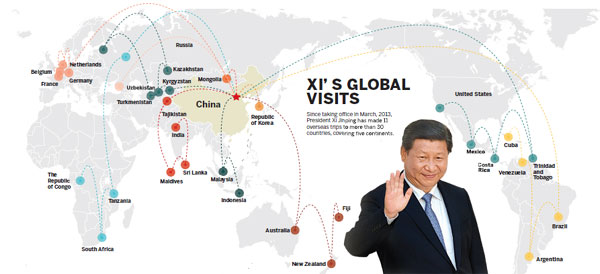
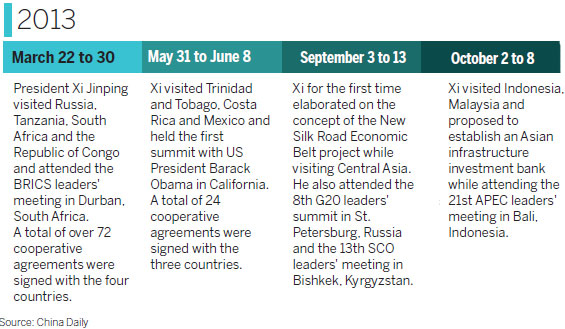
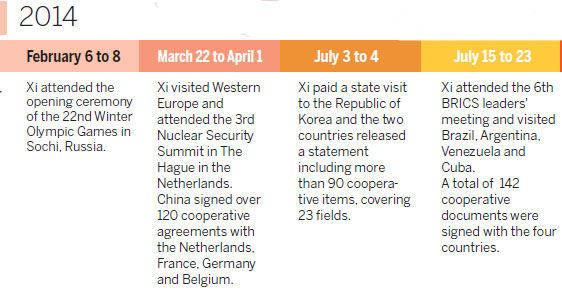
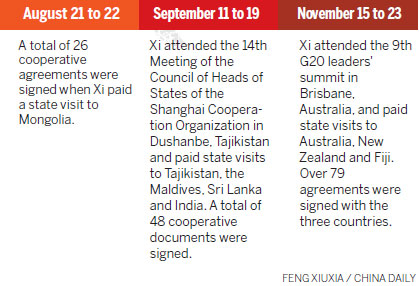
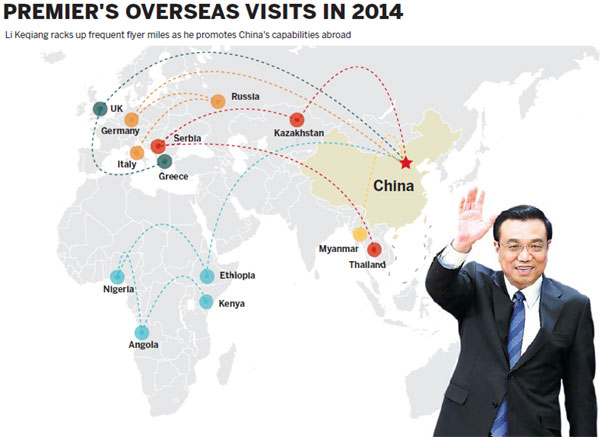
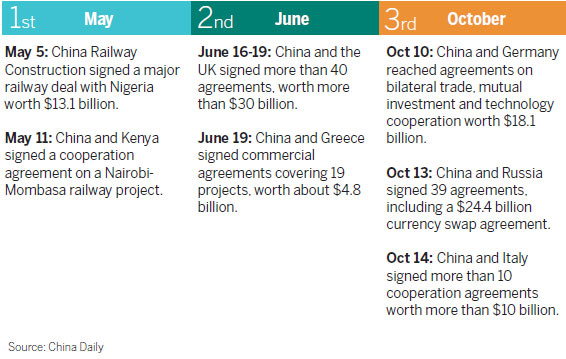
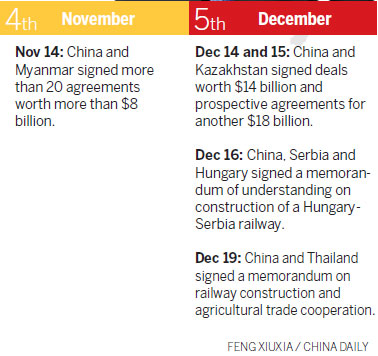
(China Daily European Weekly 01/09/2015 page6)
Today's Top News
Xi sends condolences to France over terror attack
Hunt for 2 in French shooting; 1 surrenders
2015: Change on and by the Internet
China nets 680 fugitives in anti-graft drive
Making a clean breast of it
Credit Suisse's China partner under investigation
Belarus' Domracheva named Europe's Athlete of 2014
China's influence in global film market expanding: report
Hot Topics
Lunar probe , China growth forecasts, Emission rules get tougher, China seen through 'colored lens', International board,
Editor's Picks

|

|

|

|

|

|





